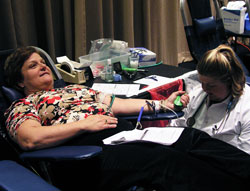NCEA Convention
Catholic educators take time to donate blood at NCEA convention

Rita Parsons, left, donates blood with the help of an unidentified nurse during the blood drive at the National Catholic Educational Association convention in Indianapolis on March 26. The principal of Holy Spirit School in Indianapolis, Parsons was one of 104 people who donated blood to show the attitude of giving of yourself. (Photo by John Shaughnessy)
By John Shaughnessy
As she sat in the chair giving blood, Kathy Mears thought of her sister, Jean.
Mears remembered the many times that she and Jean’s seven other siblings took turns giving pints of blood to try to
help their sister in her battle against a blood-related cancer.
“When she was ill, she needed blood,” Mears recalled. “In a family of nine siblings, it wasn’t bad to give blood.”
Unfortunately, Mears’ sister, Jean Burton, died of the cancer five years ago. Still, in her honor, Mears made sure she gave blood again on March 26 during a blood drive at the National Catholic Educational Association convention in Indianapolis.
“It’s a personal thing. It’s my way of giving back to the community,” said Mears, an associate director of schools for the Archdiocese of Indianapolis and a member of the convention’s organizing committee.
Indeed, many of the people who
participated in the blood drive had their own personal stories and reasons for contributing to an effort that collected 104 pints of blood.
“I started off giving blood because I wanted to get over my fear of needles,” said Chris Sciullo of Columbia, Md., who worked as a video technician at the convention. “Now when I do give, it makes me feel rejuvenated afterwards. Maybe it’s just the good feeling of giving.”
Rita Parsons donated blood during the convention because she remembered how her husband of 21 years, Larry, needed it last year.
“He received three pints of blood because his hemoglobin was low,” said Parsons, principal of Holy Spirit School in Indianapolis. “He had some bleeding going on that we weren’t aware of. That was our first experience with receiving blood, and it made us think how it’s important to donate.”
Although it’s serious business, the idea for the blood drive at the NCEA convention actually started as a joke. Heidi Imberi recalled how she first mentioned the idea at one of the planning meetings.
“I said, ‘We give everything we have to Catholic education. We give our time, our sweat and our tears. Just take our blood, too,’ ” recalled Imberi, the principal at St. Joseph School in Corydon and the co-chair for elementary education at the convention.
“Even as the words came out of my mouth, I hoped no one saw it as a smart-aleck comment,” Imberi continued. “Then I really did think it was a good idea. Blood is our life. Without blood, we don’t have anything.”
When the idea became a plan, Imberi received one of the most enthusiastic responses from Benedictine Sister Joyce Marie Newton, who teaches the fifth- and sixth-grades at St. Joseph School.
“She’s in her 60s,” Imberi said. “She told me, ‘I don’t know if I can give blood based on the medications I’m on now, but I want to.’ She had a heart attack, but she’s doing better now. She’s such a giving person.”
It’s an attitude that Catholic educators try to model for their students, Imberi said.
“We try to teach our kids, ‘It’s not what you do for yourself. It’s what you do for other people,’ ” she said. “As teachers, the blood drive gives us the opportunity to live out what we do every day.” †
